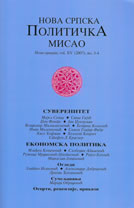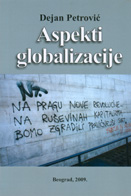| NSPM in English | |||
Casting A Bone |
 |
 |
 |
| уторак, 25. март 2008. | |
 It seems that being well-disposed toward the Socialist Party of Serbia, both the one led by Milo šević and this one, led by Dačić, is one of the few things I haven't been suspected of. Therefore, it is much easier to fully agree with Ivica Dačić's solitary voice. He was one of the few Serbian politicians who voiced that dissolving the Parliament and pre-term parliamentary elections are a bad idea, that it will weaken Serbia's position in the key moments of its struggle for Kosovo and that some kind of national unity government would have been a better choice. It seems that being well-disposed toward the Socialist Party of Serbia, both the one led by Milo šević and this one, led by Dačić, is one of the few things I haven't been suspected of. Therefore, it is much easier to fully agree with Ivica Dačić's solitary voice. He was one of the few Serbian politicians who voiced that dissolving the Parliament and pre-term parliamentary elections are a bad idea, that it will weaken Serbia's position in the key moments of its struggle for Kosovo and that some kind of national unity government would have been a better choice. Of course, it is disputable whether Mr. Dačić's opinion comes purely from his patriotic impulse or his scepticism was partly influenced by the fact he would have to lead a difficult uncertain battle for votes and reaching above the cut-off mark. Whatever the reason, what he said is true. All others have played heroes, pretending everything was just fine and acted as if there was nothing more sensible and normal than bringing down a government which was formed after five months and lasted about ten. Or that Serbia is left with a dissolved Parliament and outgoing government in the midst of diplomatic efforts and political battles to lessen the impact of Kosovo's unilateral declaration of independence. And so Serbia will have to hold elections once again. Including the constitution referendum, it is going to be, believe it or not, fifth “momentous” and “historic” vote in less than a year and a half. It's going to be the fifth successive vote in which Serbian voters will be called to vote for “better living” and “Kosovo's remaining in Serbia ”. And both Kosovo and better living seem to be getting away. It is said that elections are maturity tests and schools of democracy. But in old and stable democracies these tests have a fixed schedule, usually every four years. After all, even in politically unstable countries like Italy , there have never been so many elections in such a short time. And in those countries – at least it used to be so –elections mostly boill down to popular entertainment and some kind of political circus outside of which life is more or less normal. Unlike other countries, it seems that in Serbia everything stops, that everything is delayed and challenged. Business, plans, projects, agreements... Everybody waits to see “what will happen” and puts everything off till “after the election.” On May 11 Serbia will have been in a permanent election campaign for five months to a day. It will have been five months since any serious work was actually done, five months of waiting, calculating, comparing things and scrutinizing them. At the same time, the only thing that flourishes is political marketing, followed by political demagogy; there is a lot of hot air, and new magazines, throwaway journalists, analysts and experts are mushrooming. What has happened to the famous “national strategy” in case of Kosovo's independence which coalition partners had been harmonizing for months behind closed doors? What is going to be our state policy and who will exert pressure on countries who are preparing to or considering recognition of Kosovo? Who will recall the ambassadors to the countries which have recognized it in the meantime? Who will sever diplomatic relations with, say, Slovenia and some other countries which are, like Slovenia and its diplomacy, too eager to support the “young democracy” in Kosovo? Who will ask foreign ministries of the countries which recognized Kosovo to recall their ambassadors to Belgrade ? Or is this political crisis simply meant to avert the attention of the public from Kosovo, cause disunity within Serbia and prevent the state from doing what simply has to be done in a situation like this? Part of the domestic public often claims that everything in Serbia is off-center and repeatedly laments the fact that we don't live and act like the “rest of the normal world”. It is for the sake of this normality that we have to take at least one of many measures which every government of a normal country in the world would take. So let us forget for a moment about national heroes, myths and ordeals. I don't ask for any particualr sacrifices. Just a little national dignity and self-respect. Nothing more than you can find among the cold English, reserved Swedish, rational Swiss, cunning Greeks or neighbouring Croats. Why, just a couple of years ago, in their patriotic zeal, Americans removed French fries from menus just because of its name and organized a real campaign against French wine in restaurants. And the only French “sin” was their government's refusal to support American war adventure in Iraq . Let's think for a while. The war option and anything like it is absolutely out of the question, as was solemnly promised by all political parties, including the radicals, who used to be a bit tentative about it. Likewise, both before and after Kosovo's declaration of independence numerous business experts explained that any kind of economic sanctions towards Kosovo are out of the question, since they would supposedly affect the Serbs living there. Finally, a boycott of products and companies from countries which recognize Kosovo was stigmatized as a suicidal act which would change nothing, apart from infuriating foreign investors and would boomerang against Serbia itself. And demonstrations and outbursts of anger in Serbain streets were condemned as barbarity which “destroys our image” and does us disservice. As it was said, all that we have at our disposal are “diplomatic means”. Well, these means are limited and they range from total breach in relations, lowering them (to that of charge d'affairs level) to mild forms including “recalling ambassadors for consultations” or simply issuing protest notes. While Serbian government was still more or less united, they opted for the mild diplomatic reaction – which is, by the way, inappropriate to the gravity of the situation. (Such steps are usually taken in case of harmless border incidents, such as fishing in territorial waters of another country or minor espionage affairs). But strangely enough, some people in Serbia and its government seem to think even this is too much. “How can we strain the relatons with our closest business partners and members of the association we are aiming to get into?” – is what we could hear in the past few weeks. The same “arguments” were reiterated against taking legal actions against the countries which recognized Kosovo's illegal declaration of independence at international and national courts. Of course, these lawsuits would not change much – just the same as recalling ambassadors is essentialy harmless and mild diplomatic measure. When the dust settles and passions simmer down, ambassadors can always return quietly. But these were literally last things which more or less save the reputation of the state and keep up appearances of national pride and self-respect. And that was the point, as it seems. Serbian troublemakers were not only supposed to be defeated but also humiliated. And that is the real meaning of indecent offers, i.e. various “political agreements” offered by the West and of the current election cycle/circus. If Serbs didn't want to recognize Kosovo's independence, they should be forced to elect a government which will not be able, capable or willing to do anything about it. They should be beheaded, puzzled, disunited and paralyzed. And to be honest – whether we like it or not – one must admit that the authors and directors of this scenario are doing a fine job of it. By the way, have you asked yourselves where “our guys” have been and what they have been doing? |
Од истог аутора
Остали чланци у рубрици
- Playing With Fire in Ukraine
- Kosovo as a res extra commercium and the alchemy of colonization
- The Balkans XX years after NATO aggression: the case of the Republic of Srpska – past, present and future
- Из архиве - Remarks Before the Foreign Affairs Committee of the European Parliament
- Dysfunction in the Balkans - Can the Post-Yugoslav Settlement Survive?
- Serbia’s latest would-be savior is a modernizer, a strongman - or both
- Why the Ukraine Crisis Is the West’s Fault
- The Ghosts of World War I Circle over Ukraine
- Nato's action plan in Ukraine is right out of Dr Strangelove
- Why Yanukovych Said No to Europe

.jpg)





















